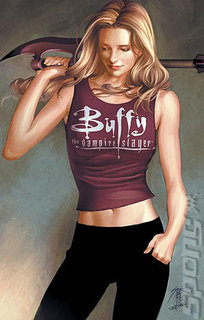The point at which you start to get problems is when you get tie-in media that's just presented as a continuation of a character's exploits in another format, then later ignored in the source material as it progresses.
Take, for example, the Buffy comics. While the TV series was still ongoing Dark Horse produced numerous licensed comics designed to fit around what happened in the TV show. The comics were designed to hang off the show's continuity. After the show ended, Joss Whedon stepped in and said, 'we're doing Buffy Season 8 as comics, these ones are canon'.
The flipside of that? Presumably, the prior comics weren't 'canon'. And why would they be? Whedon always kept a reasonably strong hold on the show and it was watched by millions of people. He had little (if any) involvement in the comics, and they sold a few thousand copies.*
All of which leaves the reader with a 'why should I care' feeling about the earlier comics. Nothing of any significance could happen, because Dark Horse didn't want to contradict the TV show, and there was no way the TV show was going to acknowledge anything of note that happened in the comics. In fact, it could well cast away or fail to notice anything that's not of note in the comics, too. They 'didn't count'. There could be no real character development.
And this is the problem often faced by game tie-ins – particularly when there's a related film doing the rounds. They piggyback the film's continuity, but you just know that the screenwriters don't care. At best the events of the game will be quietly ignored, at worst very loudly ignored and contradicted. Either way, you know that the story you're playing through won't be built upon in the next film/comic/season of the TV show. The toys have to be left back on the shelf exactly where the developers found them.
The Amazing Spider-Man game that just came out is a perfect example of this. It's designed to tie into the film, but feels a little incongruous with it and very tacked-on.
For starters, the game doesn't even feature the actors' likenesses, never mind their voice talent. (MILD SPOILER WARNING.) Peter's staying in an apartment in the city – a move that shifts the feel of the game a few years down Spider-Man's timeline, even if he's nominally still the same age that we left him at in the film.
The action takes place on a scale that eclipses that of the film stupendously, with giant robots buzzing all over the place and loads of cross-breeds running around. And still anyone who's ever played a film tie-in game before just knows that nothing you go through in the game will ever be spoken of in the film sequels. Despite the fact that giant robots tore up New York! If I lived in a city that got torn up by giant robots, I don't think I'd ever talk about anything else again.
Putting aside the fact that the script is a little annoying, you're left with little recourse but to not give a shit. Why should you? There's nothing at stake.
Looking back at the superhero games of the last few years you see a very clear tradition of 'why should I give a shit' storytelling. X-Men Origins: Wolverine, Iron Man 1 & 2, Captain America: Super Soldier and Thor all fit the bill.
*One exception to this, as pointed out by Matt Kamen, is the slayer axe. The axe was introduced in the Whedon-written Fray comics series then later appeared in the TV show. As a series penned by Whedon, however, Fray arguably better fits alongside Season 8 than it does the earlier Dark Horse comics.
Take, for example, the Buffy comics. While the TV series was still ongoing Dark Horse produced numerous licensed comics designed to fit around what happened in the TV show. The comics were designed to hang off the show's continuity. After the show ended, Joss Whedon stepped in and said, 'we're doing Buffy Season 8 as comics, these ones are canon'.
The flipside of that? Presumably, the prior comics weren't 'canon'. And why would they be? Whedon always kept a reasonably strong hold on the show and it was watched by millions of people. He had little (if any) involvement in the comics, and they sold a few thousand copies.*
All of which leaves the reader with a 'why should I care' feeling about the earlier comics. Nothing of any significance could happen, because Dark Horse didn't want to contradict the TV show, and there was no way the TV show was going to acknowledge anything of note that happened in the comics. In fact, it could well cast away or fail to notice anything that's not of note in the comics, too. They 'didn't count'. There could be no real character development.
And this is the problem often faced by game tie-ins – particularly when there's a related film doing the rounds. They piggyback the film's continuity, but you just know that the screenwriters don't care. At best the events of the game will be quietly ignored, at worst very loudly ignored and contradicted. Either way, you know that the story you're playing through won't be built upon in the next film/comic/season of the TV show. The toys have to be left back on the shelf exactly where the developers found them.
The Amazing Spider-Man game that just came out is a perfect example of this. It's designed to tie into the film, but feels a little incongruous with it and very tacked-on.
For starters, the game doesn't even feature the actors' likenesses, never mind their voice talent. (MILD SPOILER WARNING.) Peter's staying in an apartment in the city – a move that shifts the feel of the game a few years down Spider-Man's timeline, even if he's nominally still the same age that we left him at in the film.
The action takes place on a scale that eclipses that of the film stupendously, with giant robots buzzing all over the place and loads of cross-breeds running around. And still anyone who's ever played a film tie-in game before just knows that nothing you go through in the game will ever be spoken of in the film sequels. Despite the fact that giant robots tore up New York! If I lived in a city that got torn up by giant robots, I don't think I'd ever talk about anything else again.
Putting aside the fact that the script is a little annoying, you're left with little recourse but to not give a shit. Why should you? There's nothing at stake.
Looking back at the superhero games of the last few years you see a very clear tradition of 'why should I give a shit' storytelling. X-Men Origins: Wolverine, Iron Man 1 & 2, Captain America: Super Soldier and Thor all fit the bill.
*One exception to this, as pointed out by Matt Kamen, is the slayer axe. The axe was introduced in the Whedon-written Fray comics series then later appeared in the TV show. As a series penned by Whedon, however, Fray arguably better fits alongside Season 8 than it does the earlier Dark Horse comics.
Read More Like This
Comments
This I all, I think "nerdy pedantry". The reason being that all of these media (or mediums if you prefer) reinvent, re-start, reboot and remix themselves with careless abandon.
The Spider-man films to which you are referring completely and totally ignore the fact that JUST FIVE YEARS AGO Tobey Maguire was poncing about in the Red and Blue spandex.
Before The Dark Knight movie pissed on the memory of Val Kilmer pissing on the memory of Michael Keaton pissing on the memory of Adam West pissing on the memory of Lewis Wilson, the comic of the same name pissed on the memory of Seventies Batman comics pissing on the memory of Silver Age Batman comics pissing on the memory of Golden Age Batman comics.
You are talking about media that are by their own choice ephemeral. Media the multifarious and multitudinous creators of which, in their shortage of ideas and their excess of ideas, rehash and ignore preceding ones in their enthusiasm to promulgate new ones. Media which licence, re-licence, syndicate, and replicate their IP wherever they can. Your citing of Whedon is telling, because he is one of the few auteurs in the industry who has the creative chops and the commercial power to care about his characters and to exercise that care. Most of the rest is aspirational hired hands churning out sausage meat for the Disney or Warner Brothers machines, and when they are told to change the flavour - they do it. Because they have to.
The idea that there is canon is actually balls.
The Spider-man films to which you are referring completely and totally ignore the fact that JUST FIVE YEARS AGO Tobey Maguire was poncing about in the Red and Blue spandex.
Before The Dark Knight movie pissed on the memory of Val Kilmer pissing on the memory of Michael Keaton pissing on the memory of Adam West pissing on the memory of Lewis Wilson, the comic of the same name pissed on the memory of Seventies Batman comics pissing on the memory of Silver Age Batman comics pissing on the memory of Golden Age Batman comics.
You are talking about media that are by their own choice ephemeral. Media the multifarious and multitudinous creators of which, in their shortage of ideas and their excess of ideas, rehash and ignore preceding ones in their enthusiasm to promulgate new ones. Media which licence, re-licence, syndicate, and replicate their IP wherever they can. Your citing of Whedon is telling, because he is one of the few auteurs in the industry who has the creative chops and the commercial power to care about his characters and to exercise that care. Most of the rest is aspirational hired hands churning out sausage meat for the Disney or Warner Brothers machines, and when they are told to change the flavour - they do it. Because they have to.
The idea that there is canon is actually balls.
@DoctorDee My point being that it's precisely when things like games stop trying to pander to an established continuity that they work the best. Films are good at this because Hollywood is confident (or arrogant) enough to reinvent/re-interpret properties that were birthed in other mediums. Games, books and comics are much more likely to try to play in the established sandbox, and as a result end up feeling very peripheral with very disposable stories.



